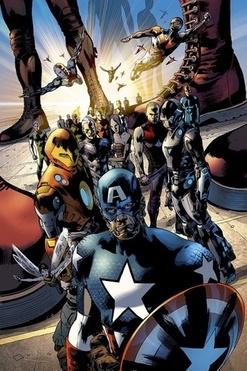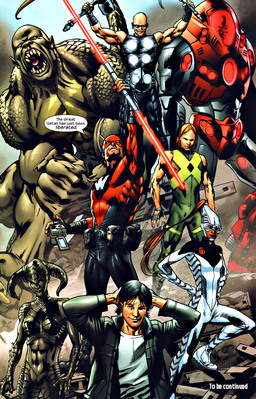Should the Ultimates Have Saved America?
By Zak Edwards
September 6, 2009 - 11:45
With Mark Millar back on Marvel’s Ultimate Comics line writing their version of the Avengers, I found myself going back to his original run on the Ultimates, appropriately called Ultimates 1 and 2. After rereading all twenty-six issues of the series, I found myself thinking about the legitimacy of the super-hero in Millar’s story. The Ultimates, almost notoriously, introduced Ultimate versions of classic characters who had their nobility removed. Captain America, for example, was still the physical embodiment of the perfect male but no longer had the soul to back it up. He’s possessive, aggressive, stuck completely in the past, and picks and chooses advancements in society while remaining self-righteous on the moral degradation of the new world against the one he grew up in. Similarly, other members of the team have serious issues, from being in domestically violent relationships to bouts with alcoholism and beyond. But what I really want to focus on in this article is the larger world around these questionable persons of mass destruction, focusing mostly on the last arc of Ultimates 2, around issues 7 to 13.
 |
A question I found myself asking in this series was ‘is this invasion of the United States really a bad thing?’ The invaders take over the States with no more civilian casualties than what destruction the Ultimates have been shown to cause on their own soil. Furthermore, the Liberators are not depicted as making gross sums of money like the Ultimates, and doing something for free is generally considered much more noble then doing the same action for monetary profit. The priority of the Liberators, the invading group, is to make the world a safer place, to “stop preemptive strikes” and to have America’s plans “curtailed” for fear of what they may do next, all while ensuring the American people don’t “suffer for the crimes of their government.” The language used by Millar echoes that of what the American government has been saying for years now, the excuses they used, as if their global policy is a form of preventative maintenance. Only now, it turns out Americas self-made enemies have done a better job of invading an enemy territory than the States could ever imagine. The new regime lasts only a couple of days at best before the Ultimates come in to do the inevitable saving of the day (if it needed saving at all), but the only oppression on the American people depicted is a curfew and non-violent crowd control taken care of by Hank Pym’s androids. The invaders talk of free elections, a single piece of dialogue which packs some of the most political punch in the entire series, suggesting the free world, who has been leading the charge into the Middle-East is not, in fact, free at all, simply more covert in its lack thereof. People who have seen Michael Moore’s Fahrenheit 9/11 are aware of possible election fraud present in the United States and these Liberators (this name itself being highly politicized and utilizing much of the language the American government has used for justification of its invasions of the Middle-East) have come to ensure the voice of the people is heard, after they take over of course. This is another aspect of this story, while the Liberators are mirroring America’s invasion of Iraq while doing a better job, the complexities of the justifications and procedures of such an act are still discussed.
 |
| The Liberators: Abomination, Perun, Crimson Dynamo, Abdul al-Rahman, Schizoid Man, Hurricane, and the Swarm |
The final arc of Ultimates 2 turns the tables, making the United States a version of Iraq while making the international collective of the Liberators a reflection of the United States. The natural reaction is to polarize the characters of the Ultimates and the Liberators, believing one side (the American side) to be wholly good while the other to be wholly bad, but Millar complicates this through demonstrations of grey areas. Both sides are so grey they meet in the middle. As Ultimates had always been a politically charged comic book series, discussing the effects of persons of mass destruction on America’s recent attempts at ‘liberating’ the world it can’t understand. The first panel of the issue entitled “Axis of Evil” mocks the classic patriotic shots of Captain America, showing him pointing to the sky, his uniform shining in the sun, saying move along to people he has just forced from their homes, people who know “the Americans shoot you if there are no cameras around.” Millar’s concerns are ones every citizen should have, questioning government actions and allegiances. I remember reading a quote from an American paper once, the journalist was asking how someone could be so unpatriotic as to not support their own president. A view, I feel is one of the most frightening things I have ever read, and Mark Millar demonstrates why.
Related Articles:
The ultimate G.I. Joe Classified Army-Building Guide Part Three
The ultimate G.I. Joe Classified Army-Building Guide Part Two
The ultimate G.I. Joe Classified Army-Building Guide Part One
Review: Ultimate Chicken Horse
Bluefin Announces Ultimate Muhammad Ali Action Figure
Review: Gears of War Ultimate Edition
Ultimate Comics: Spider-Man #23 Review
Ultimate Comics: Spider-Man #16.1 Review
Ultimate Comics: Spider-Man #16
Ultimate Comics: Iron Man #1
